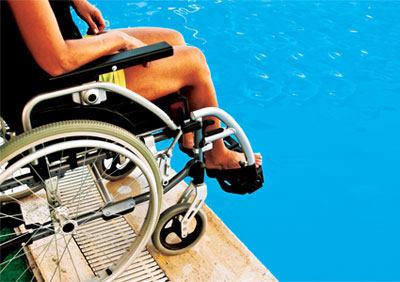The Department of Justice on Thursday announced a dramatic about-face on disability regulations for public swimming pools and spas. The new rules are outlined in a technical assistance document and FAQ. Among other things, the new rules allow portable lifts and lower the bar for compliance.
For Title III facilities (hotels, swim clubs etc.), portable lifts purchased before March 15, 2012, are allowed, if kept in position for use at the pool and operational during all times that the pool is open to guests. The DOJ states that it will not be enforcing the fixed lift requirement for those operators; however, “generally, lifts purchased after March 15, 2012 [the original compliance deadline] must be fixed if it is readily achievable to do so.”
It further redefines what it means for ADA compliance to be readily achievable. “Readily achievable means that it is easily accomplishable without much difficulty or expense,” the department told the Washington Times. “This is a flexible, case-by-case analysis, with the goal of ensuring that ADA requirements are not unduly burdensome, including to small businesses.” That is a much different tone and language than the DOJ had used previously on that same question.
For Title II facilities (municipal pools) DOJ states that every pool in an organization does not have to be accessible. However, if there is only one pool facility, the entity must ensure that the aquatics program is accessible.
Concerns over accessibility requirements have been growing since early this year. The new requirements were issued May 24, days after the DOJ announced that it would extend the deadline for compliance to January 31, 2013.
“We’re pleased to see the clarity,” said Jennifer Hatfield, director of government affairs for the Association of Pool and Spa Professionals.




